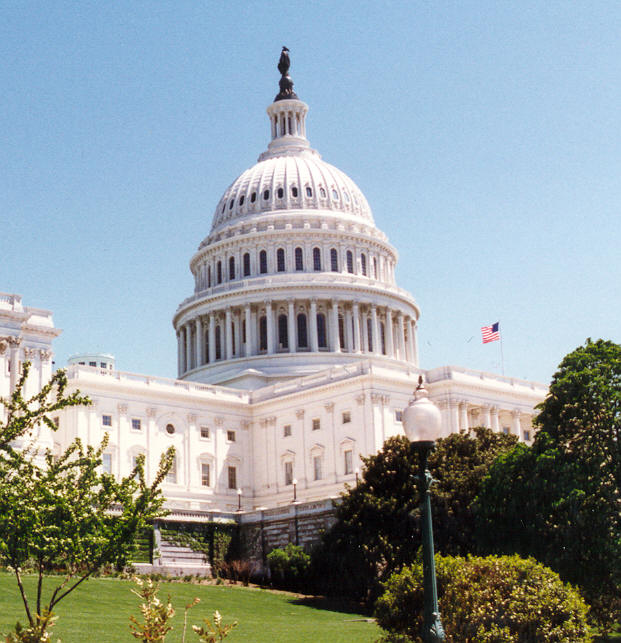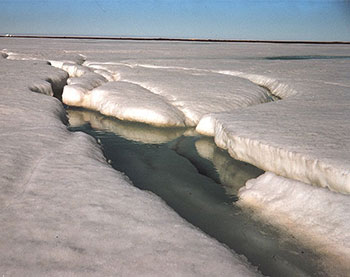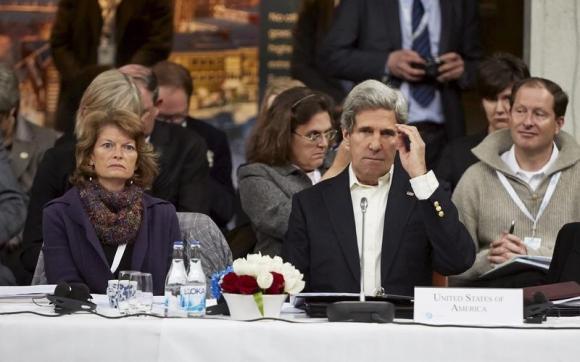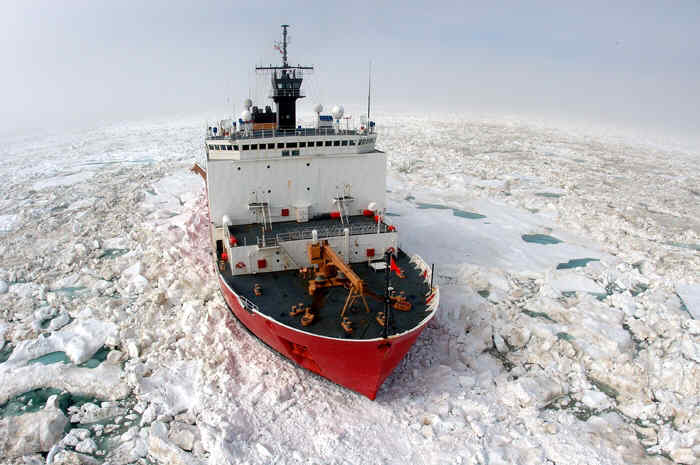|
|
|
|
|
|
|
|
Updated feature of the Arctic Update! Some servers may prevent subscribers from accessing HTML. We have added a feature to allow subscribbers to view the Update on the web instead of in their email. If you develop issues viewing this email, please click the "Click here: Having Trouble Viewing this Email?" link at the top of this email.
 Today's Congressional Action: Today's Congressional Action:
The House and Senate are not in session.
|
Hungry Polar Bears Surround Arctic Researchers at Russian Weather Station. Russian weather scientists in a remote Arctic area are surrounded by five hungry polar bears and essentially trapped inside their research station, according to the World Wildlife Fund. Two meteorologists and a mechanic have been unable to leave the Fyodorov weather station on Vaygach Island, and cannot take their twice-daily sea measurements, due to the polar bears lurking nearby. Huffington Post
 Sea Ice Melted Faster Than Usual in August, on Pace for 3rd- or 4th-lowest Year on Record. Arctic sea ice this year was melting faster than is usual as August ended -- perhaps fast enough to open a deepwater route in Northwest Canada for the first time since 2007, experts said. Only a small portion of the M'Clure Strait passage through the Canadian Arctic Archipelago was blocked by ice at the end of August, according to the monthly report from the National Snow and Ice Data Center. And if the ice continues to retreat as fast as it has in the last few weeks, the passage, which is a better route for big ships than the shallower Northwest Passage, could open within a week. Alaska Dispatch News Sea Ice Melted Faster Than Usual in August, on Pace for 3rd- or 4th-lowest Year on Record. Arctic sea ice this year was melting faster than is usual as August ended -- perhaps fast enough to open a deepwater route in Northwest Canada for the first time since 2007, experts said. Only a small portion of the M'Clure Strait passage through the Canadian Arctic Archipelago was blocked by ice at the end of August, according to the monthly report from the National Snow and Ice Data Center. And if the ice continues to retreat as fast as it has in the last few weeks, the passage, which is a better route for big ships than the shallower Northwest Passage, could open within a week. Alaska Dispatch News
Five Circumpolar States Strike New Deal to Protect Polar Bears. The five nations with polar bear populations - Canada, the Kingdom of Denmark (Greenland), Norway, Russia, and the U.S. - reached a non-binding agreement Sept. 2 in Ilulissat, Greenland, on what the World Wildlife Fund calls the "first-ever circumpolar action plan" to protect and manage polar bears and their habitat. The key to the success of this non-binding plan, approved at a meeting that also included many indigenous representatives, is collaboration, the signatories said. Nunatsiaq Online
 Secretary Kerry Focused on Arctic Issues. Secretary of State John Kerry told reporters Sunday evening that he understands the Alaska has reservations about federal involvement, perhaps with good reason. But as chair of the Arctic Council for the next two years, and backed by a president who takes the issue of climate change very seriously, Kerry said he believes progress - the kind Alaskans will approve of - is possible. "I know that Alaskans have long felt that Washington and the rest of the country do not understand the special issues that arise in living in Alaska," Kerry told a group of Alaska journalists on his first evening in the state. "This gives us an opportunity to highlight them as well as focus on the very significant impact of climate change, which is not what it's all about, but it's a large part of what its about." The Bristol Bay Times Secretary Kerry Focused on Arctic Issues. Secretary of State John Kerry told reporters Sunday evening that he understands the Alaska has reservations about federal involvement, perhaps with good reason. But as chair of the Arctic Council for the next two years, and backed by a president who takes the issue of climate change very seriously, Kerry said he believes progress - the kind Alaskans will approve of - is possible. "I know that Alaskans have long felt that Washington and the rest of the country do not understand the special issues that arise in living in Alaska," Kerry told a group of Alaska journalists on his first evening in the state. "This gives us an opportunity to highlight them as well as focus on the very significant impact of climate change, which is not what it's all about, but it's a large part of what its about." The Bristol Bay Times
Glacier Expert Willis Named to Arctic Mapping Team. Michael Willis, Cornell earth and atmospheric sciences research associate, has been named to the ArcticDEM scientific team that will - for the first time - create high-resolution topographical Arctic maps. President Obama announced the project - funded by the National Science Foundation and the National Geospatial-Intelligence Agency - on his trip to Alaska Sept. 2. "This project will provide a state-of-the-art topography baseline against which future measurements of the Arctic can be compared. The Arctic will go from being one of the most poorly mapped regions on the planet to one of the most detailed, in one revolutionary step," said Willis. Cornell Chronicle
 [Opinion] US Talk on Arctic Must be Matched with Investment. For too long, our country has fallen short in meeting its commitments as an Arctic nation. But the Arctic region has captured more attention in recent months, in part because of its drastically changing climate. This week, President Obama held a conference in Anchorage, Alaska, to discuss Arctic issues with the many countries involved in the region. This high-level meeting is a big step forward. We now need to match strong talk with action to fulfill our role as an Arctic nation. To help our country and our colleagues understand the opportunities and challenges we face, Congressman Don Young and I formed the Congressional Arctic Working Group last year. Since then, we have been pushing our colleagues and the administration to pay more attention to the growing needs of this region. Huffington Post [Opinion] US Talk on Arctic Must be Matched with Investment. For too long, our country has fallen short in meeting its commitments as an Arctic nation. But the Arctic region has captured more attention in recent months, in part because of its drastically changing climate. This week, President Obama held a conference in Anchorage, Alaska, to discuss Arctic issues with the many countries involved in the region. This high-level meeting is a big step forward. We now need to match strong talk with action to fulfill our role as an Arctic nation. To help our country and our colleagues understand the opportunities and challenges we face, Congressman Don Young and I formed the Congressional Arctic Working Group last year. Since then, we have been pushing our colleagues and the administration to pay more attention to the growing needs of this region. Huffington Post
Consequences of Loss of Ice in Arctic Investigated. Researchers from the University of Aberdeen are set to investigate what consequences the rapidly shrinking sea ice cover in the Arctic is having on the marine ecosystem. Sea ice is a unique feature of polar marine ecosystems and the loss of sea ice in the Arctic, whichis often referred to as amongst the most striking evidence of climate change, makes these ecosystems particularly sensitive to climate change. Phys.Org
|
|
Legislative Action
No Arctic legislation was formally considered yesterday.
|
|
Future Events
11th Conference on Hunting and Gathering Societies (CHAGS XI), September 7-11 (Vienna, Austria). The study of hunter-gatherer societies has become, since the landmark conference "Man and Hunter" in 1966, a major topic of study within the social and human sciences community. While scholarly foci have changed during the last 50 years, the principle goal generated during the initial conference, to establish a unified field of hunter-gatherer studies, is as valid today as it was then. CHAGS XI hopes to explore how research results since 1966 and new research agendas can be applied for present and future study.
Eighth Polar Law Symposium Alaska 2015, September 23-26, 2015 (Fairbanks and Anchorage, Alaska , USA). The Eighth Polar Law Symposium is co-hosted by Alaska Pacific University (APU), the University of Alaska Fairbanks, the University of Alaska Anchorage (through its Justice Center and its Institute of Social and Economic Research), the University of Washington School of Law, and Vermont Law School, in cooperation with the Arctic Law Section of the Alaska Bar Association. The symposium will be held on both campuses of the University of Alaska. The 2015 theme is: The Science, Scholarship, and Practice of Polar Law: Strengthening Arctic Peoples and Places.
2015 Arctic Energy Summit, September 28-30, 2015 (Fairbanks, Alaska, USA). The Institute of the North's 2015 Arctic Energy Summit builds on our legacy efforts to address energy as a fundamental element of the sustainable development of the Arctic as a lasting frontier.Central to this concept is a focus on providing pathways for affordable energy development in the Arctic and for Arctic communities.
The Arctic Circle is the largest global gathering on the Arctic. It is attended by heads of state and governments, ministers, members of parliament, officials, experts, scientists, entrepreneurs, business leaders, indigenous representatives, environmentalists, students, activists, and others from the growing international community of partners and participants interested in the future of the Arctic. The Arctic Circle highlights issues and concerns, programs, policies and projects; it provides platforms for dynamic dialogue and constructive cooperation. While the plenary sessions are the responsibility of the Arctic Circle, the breakout sessions are organized by various participating partners in their own name and with full authority over the agenda and the choice of speakers.
2015 Arctic Science Conference, October 1-3, 2015 (Anchorage, Alaska, USA). The conference theme is "Healthy Estuaries: Sustainability and Resilience." Conference topics include traditional scientific disciplines, science education, arctic social sciences, biomedical research, and artistic interpretation of the evolving North. Abstract submissions are now being accepted. The deadline is August 1, 2015.
The Polar Oceans and Global Climate Change, November 3-6, 2015 (La Jolla, California USA). The American Polar Society will host this Symposium at Scripps Institution of Oceanography. A flyer with a partial list of presenters is available on the Society's website (americanpolar.org) and from the Society's Membership Chairman by email.
Forum for Arctic Modeling and Observational Synthesis Meeting, November 3-6, 2015 (Cape Cod, MA, USA). On November 3rd, the 2015 School for young scientists will consider "Regional Oceanography of the Arctic marginal seas" with lectures covering major features of atmospheric, sea ice and oceanographic regimes of the: Bering, Chukchi, Beaufort, East-Siberian, Laptev Sea, Kara, Barents and Nordic seas. On November 4-6, the meeting portion will summarize project accomplishments for the last 3 years of activities and will focus on the formulation of scientific questions and directions for FAMOS future research (2016-2019) to: (a) improve Arctic modeling, employing very high resolution models; (b) develop and test new arctic monitoring/observing systems and (c) improve predictions of Arctic environmental parameters with reduced uncertainties.
Due North: Next Generation Arctic Research & Leadership, November 5-8, 2015 (Calgary, Alberta, Canada). The Association of Canadian Universities for Northern Studies (ACUNS) will convene an interdisciplinary conference of early career scientists working on Arctic issues. Topics will include: Arctic Communities, Arctic Sustainable Development, Arctic Wildlife, Ecosystem and Biodiversity, Arctic Food Security, Arctic Landscapes, Climate Change and Adaptation, Disaster Risk Management, Policy, Politics and Leadership, Arctic Environment (Data and Techniques), Arctic Resources, and Future of Arctic.
Arctic Observing Open Science Meeting, November 17-19, 2015 (Seattle, Washington). The Arctic Observing Open Science Meeting will be 2.5 days and held at the Hyatt at Olive 8 in Seattle, Washington. The conference will bring together individuals and teams involved in the collection, processing, analysis, and use of observations in the Arctic - from academia, agencies, industry, and other organizations. The meeting will be convened as a combination of plenary talks, parallel science sessions, and a poster session. The agenda and registration information will be forthcoming.
In the Spirit of the Rovaniemi Process 2015, November 24-26, 2015 (Rovaniemi, Lapland, Finland).When the Arctic Environmental Protection Strategy, the so-called Rovaniemi Process, was adopted in 1991, it aimed at overcoming divisions and turning the zone of Cold War military tensions into a region of peace and co-operation. In this joint effort focusing on the protection of environment, and later, sustainable development, the Arctic states supported by indigenous organizations laid grounds for institutionalized collaboration and the emergence of Arctic regional identity. The second international conference will bring together decision-makers, scholars, artists, designers and students to address these questions and discuss the Arctic in global, regional and local perspectives.
|
|

  
4350 N. Fairfax Drive, Suite 510
Arlington, VA 22203, USA
External links in this publication, and on the USARC's World Wide Web site ( www.arctic.gov) do not constitute endorsement by the US Arctic Research Commission of external Web sites or the information, products or services contained therein. For other than authorized activities, the USARC does not exercise any editorial control over the information you may find at these locations. These links are provided consistent with the stated purpose of this newsletter and the USARC Web site.
|
|
|
|
|
|
|
|
|